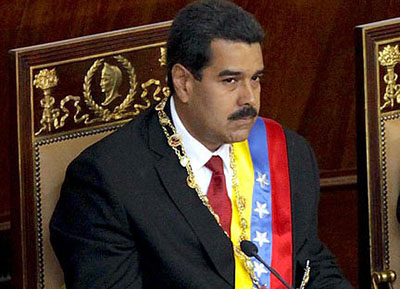Special to WorldTribune.com
 By John J. Metzler, December 8, 2023
By John J. Metzler, December 8, 2023
Venezuela’s ruling Marxists are using some time-honored tricks to give their economically battered regime an edge for next year’s presidential elections. In a classic political mobilization tactic, President Nicolas Maduro held a “referendum” to ask his citizens what the future status should be for a mineral rich but disputed region of a neighboring country, namely Guyana.
The vast Essequibo region has long been contested between Venezuela and Guyana, former British Guiana, a sovereign enclave on the shoulder of South America. The region is 61,000 sq. miles or approximately the size of the entire state of Florida. The area, which the Essequibo River forms a boundary, comprises most of Guyana’s current national territory.
Maduro’s move is a calculated threefold plan to create a crisis, to kindle Bolivarian patriotism, and to possibly prepare the political conditions to annex a sovereign territory which, though thinly populated, remains rich in minerals and also includes valuable offshore oil deposits.

The Venezuelan referendum asked voters for their Approval for granting Essequibo residents Venezuelan citizenship, creating a new Venezuelan state, and do Venezuelan voters recognize the jurisdiction of the International Court of Justice (ICJ)? One specific question asks for approval for “the creation of the Guayana Essequiba state” and its “incorporation into the map of Venezuelan territory.”
Not surprisingly the Maduro “referendum” was dutifully endorsed by 96 percent of the voters, although turnout was poor, in the non-binding referendum.
Significantly the UN’s International Court of Justice, (ICJ), ruled for restraint in the dispute.
The Hague-based ICJ ordered Venezuela to “refrain from taking any action which would modify the situation that currently prevails” in the Essequibo region, which Guyana has administered for over a century.
UN Secretary General Antonio Guterres added, via his spokesman, “The Secretary-General also notes the Court’s order to both Parties to refrain from any action, which might aggravate or ex-tend the dispute or make it more difficult to resolve.”
Guyana’s President Irfaan Ali welcomed the ruling, which he interpreted as meaning that “Venezuela is prohibited from annexing or trespassing upon Guyanese territory.” He added Guyana was committed to pursuing a peaceful, legal resolution to the dispute.
In Maduro’s bombastic populist speeches, he proclaims, “The Essequibo is ours.”
Nonetheless even Venezuela’s fledgling but determined anti-Maduro opposition parties admit the disputed region is part of Venezuelan territory.
Maduro’s ruse has the same hollow irredentist ring as Saddam Hussein’s claim that 1990’s Kuwait was a historic Iraqi province or the 1980’s Argentina’s junta assertion that the British Falkland Islands were a disputed Argentine territory known as las Malvinas?
Some argue that since the Biden Administration has relaxed tough U.S. economic sanctions on Venezuela’s petroleum exports, it behooves Maduro to behave and play the game as to break out of current international ostracism. But given Maduro’s close ties to Russia and China, Moscow or Beijing may convince the Caracas regime to take the hyper-nationalist gamble and grab the Essequibo, with the plan of reuniting the historic “province” with the Bolivarian Republic of Venezuela.
That’s the danger.
Venezuela’s socialist rulers may be betting on global crisis fatigue, namely over the wars in Ukraine, Israel/Gaza and so many other trouble spots which have muddied the waters.
As a former British colony which gained its independence in 1966, Guyana retains membership in the UK Commonwealth and is a staunchly democratic and increasingly prosperous country given it’s expanding oil wealth. ExxonMobil discovered huge oil deposits off the coast in 2015.
Freedom House, the international rights monitor, rates Guyana 73/100 and is listed as Free.
Venezuela rates only 15/100 and is ranked as Not Free.
In the meantime, the The Caribbean Community (Caricom) said in a statement the ICJ order prohibited Venezuela from taking any measure “that would change the status quo in the territory, regardless of the outcome of the Venezuelan referendum on Sunday.” It added, “Venezuela cannot by a referendum, or otherwise, violate international law and disregard the Order of the world’s highest Court.” One could hope.
Guyana is fortunate in one regard; starting in January 2024, the country will start a two-year term on the UN Security Council as a non-permanent member, thus allowing the Georgetown government an unexpected political pulpit should there be a wider crisis.
Now is the time for preventive diplomacy, to stop the impending crisis before it starts. The United States, neighboring Brazil, and the Commonwealth must draw a line and make it crystal clear to the Marxist regime in Caracas, not to touch the sovereignty of a small neighboring state.
John J. Metzler is a United Nations correspondent covering diplomatic and defense issues. He is the author of Divided Dynamism the Diplomacy of Separated Nations: Germany, Korea, China (2014). [See pre-2011 Archives]
